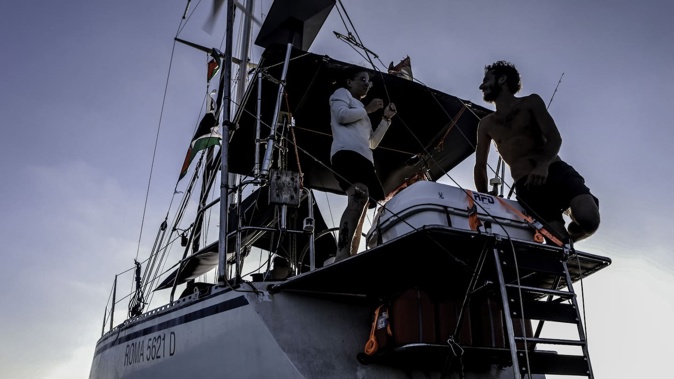
One of United States President Donald Trump’s staunch allies, Italian Prime Minister Giorgia Meloni, took office in 2022 as one of Israel’s most vocal supporters in Europe.
Fast-forward to the present. As the political ground shifts, she has dispatched an Italian warship to aid a flotilla attempting to break the Israeli blockade of Gaza.
The unprecedented response - one joined by Spain, which said it would also send a vessel - is more nuanced than the optics suggest.
Meloni has lambasted the same flotilla that the Italian Navy is rushing to aid, calling it “gratuitous, dangerous and irresponsible”.
She has also staked out a far more cautious approach on recognising a Palestinian state than have France, Britain, and other countries that did so over the past week.
But the previously unimaginable decision to dispatch the Italian warship points to the extent to which the conflict in the Middle East is engulfing domestic politics in Europe and putting its leaders in uncomfortable positions.
Meloni has said that use of military force by the Italian Navy is not “envisaged” but that it will help with rescue and assistance as needed.
Still, the move puts the right-wing Meloni in the tough spot of providing back-up to flotilla-carrying figures, including Swedish climate activist Greta Thunberg, who are reviled by the Italian Prime Minister’s base.
France and other countries that have come down harder on Israel than has Italy have also requested that the Italians aid their citizens if needed.
Meloni’s position has been significantly softer than that of Spanish Prime Minister Pedro Sánchez, a liberal who ranks among the harshest critics of Israel among European leaders.
He has called for the country to be banned from international sporting events and reportedly cancelled a major defence contract for Israeli-made rocket launchers.
Yet the move by Rome comes as the Italian public is increasingly outraged by the bloodshed in Gaza, an opinion Meloni has seemed to take to heart by growing gradually more critical of Israel.
As recently as Tuesday, tens of thousands of protesters took to the streets in Italian cities, disrupting transportation, blocking ports, and shutting down schools in a massive action in support of Gaza.
The Gaza flotilla, carrying hundreds of activists, lawyers and parliamentarians - including Italian lawmakers - set sail in August, following a long-standing tactic among supporters of Palestinians in Gaza.
It has included ships departing from the Italian port of Genoa.
The Italians acted yesterday after drones dropped stun grenades and irritants on the boats as they sailed in international waters near Greece, according to a news release from flotilla organisers.
No one was hurt, though the assault left participants shaken. The Israel Defence Forces did not respond immediately to a request for comment on the attack.
“On the flotilla, her message is clear: ‘We consider you a gang of runaways, we think you’re a threat to yourselves and others, and that you’re completely useless to the Palestinian cause, but if there’s one Italian in danger, we will protect their right to participate in a demonstration that we think insane,’” said Giovanni Orsina, dean of the political science department at Luiss University in Rome.
Italian Defence Minister Guido Crosetto told Parliament today that the decision to send a naval vessel was not meant as a “provocation”.
“This is about intervening in defence of our citizens, it is not an act of war, a provocation. It is the duty of the state toward our citizens,” Crosetto said.
The frigate, according to a senior Italian government official who spoke on the condition of anonymity, will not serve as an “escort”.
The official warned that the flotilla’s members would justly be arrested by Israel if they stayed the course (as happened during a similar attempt in June). But following the drone attack by “unknown actors”, the Government felt it had to intervene.
Even as Meloni chides the flotilla’s organisers, her supporters believe her decision to aid it will convey a political message: that she is not standing idle while others in Europe zoom past her by recognising a Palestinian state.
Meloni, in contrast, said yesterday during a visit to New York for the United Nations General Assembly that Italy would follow suit only if Hamas were excluded from government and the remaining Israeli hostages were returned.
Under mounting criticism from the European public and European Union staff, the bloc’s executive branch this month proposed downgrading trade ties with Israel by suspending preferential treatment on billions of euros of Israeli exports.
The EU foreign policy chief also proposed sanctions on two far-right Israeli ministers.
The trade plans, however, have yet to garner the majority needed to pass, and the sanctions would require unanimity. Plans to pressure Israel have so far met opposition from its key allies, including Germany, Italy and Hungary.
“Italy may be [seen by its detractors as] a ‘far-right’ government, but in the end, it’s the only country that has taken concrete measures here. They’re all pro-Palestine, but no one else does anything,” the Italian official said.
On the other hand, the Meloni Government may have also given Israel a public relations win.
Rome sought to broker a deal in which the Italians could accept the flotilla’s aid and distribute it in Gaza - an offer that flotilla representatives rejected in a statement.
The Israeli Government was quick to portray that rejection as evidence that the flotilla’s motivation was political and not about aid.
However, Arturo Scotto, a lawmaker from Italy’s opposition Democratic Party who is with the flotilla and said it would set sail towards Israel from the Greek island of Crete (tonight NZT), added that the rejection of the offer was only aimed at the involvement of Meloni’s Government - and that the group was still weighing whether to accept assistance from the Vatican.
“The objective of the mission remains to overcome the naval blockade” imposed by Israel, Scotto said.
“We are assessing a [possible] relationship between the flotilla and the Holy See. The best way for the [Italian] Government to assist in mediation is to stay out of it.”
Take your Radio, Podcasts and Music with you









